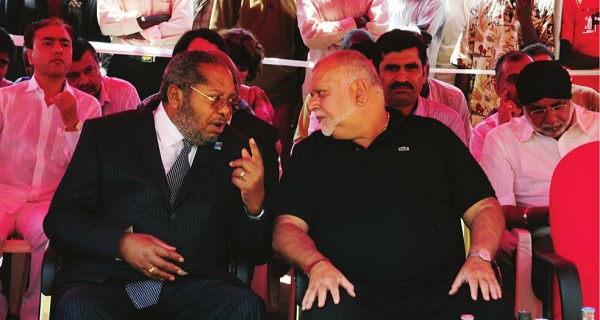
THE LAST WORD: By Andrew M. Mwenda
Lesson for Central Bank from the experience of the takeover of Crane Bank
This week, the government injected Shs 200 billion into Crane Bank to bolster its liquidity position. This is only 40% of the Shs 500 billion needed to bring the bank into a healthy liquidity position. Yet, even if an extra Shs 300 billion is pumped into the bank, it is unlikely to be enough to ensure its turnaround. This situation could have been avoided had Bank of Uganda (BoU) exercised its powers with foresight.
At the beginning of July, BoU warned Crane Bank that its nonperforming loans portfolio had eroded the bank’s capital base and asked shareholders to inject $25m (Shs 85 billion), later reduced to $10m (Shs 34 billion). The main shareholder, Sudhir Ruparelia, promised to put in this money over three months. BoU stopped Crane Bank from issuing Letters of Credit, Bid Bonds, Performance Guarantees, new loans, overdrafts and credit cards. Yet this was the third largest bank in the country with huge overheads.
Between January and June, Crane had been making Shs 6 billion in profit per month. Beginning July, the new restrictions caused the bank to make losses of Shs 2 billion per month. Besides, Crane was a bank of the business community. When all these people could not get overdrafts, Bank Guarantees, Bid Bonds, Letters of Credit, new loans etc, they began shifting their businesses to other banks, which could provide them thus leading to loss of deposits.
As many of Crane’s business customers could not get the services, they began suspecting that something was amiss. They told their friends who told their friends and business partners in turn. This caused many other people to withdraw their money. By mid October when social media began saying Crane was in trouble (causing frantic withdraws), the bank was already facing a severe liquidity problem.
Restricting Crane from doing business while keeping it open for three months was a recipe for disaster given its size and overheads. BoU should have anticipated the rumors of trouble and withdrawal of deposits. In August, Sudhir offered to borrow from BoU and mortgage some of his buildings. BoU refused this offer, a position it accepted two months later in mid-October. Thus by the time BoU took over the bank, the liquidity shortage (Shs 500 billion) was far larger than the money initially needed for recapitalisation.
BoU should have given Sudhir three months to raise the Shs 34 billion while keeping the bank running normally without the said restrictions or accepted to give him a loan against collateral of his buildings. This would have kept the bank profitable while avoiding the risks of rumors and loss of deposits that led to the liquidity crisis. Consequently, the taxpayer would not have had to fork out Shs 200 billion to inject liquidity into the bank. Yet, even Shs 500 billion may not be enough to bring Crane back to health. Why?
Crane was successful because of Sudhir’s personal intimate knowledge of the local business community and the kind of service it offered them. Whoever buys Crane Bank will not attract Sudhir’s customers. This is because they went to Crane Bank for a very specific service. Worse still, the local business community who were being served by Crane is now in a quandary.
The new owner would have bought a shell that would require many years to build public confidence. This means the new owner would have to cut the number of branches from 46 to about five, cut down employees by more than 60% and prepare to make losses for the next five years. Yet giving the bank back to Sudhir cannot be an option either because his personal reputation has been gravely damaged. And we did not need to get to this. Based on its history, there was little reason for BoU to enforce its rules with the kind of rigidity they did especially given the size and role of Crane Bank.
By end of March 2015, Crane Bank had grown from zero in 1995 into the third-largest bank in terms of shareholder funds, assets and deposits. The question for the Central bank, Uganda’s policy makers and those interested in banking policy, is: how did one man, Sudhir, do this? This is especially intriguing because Sudhir performed this feat in circumstances where the market is dominated by multinational banks – Stanbic Bank, Standard Chartered Bank, Barclays Bank and Bank of Baroda plus one institutional bank, Centenary Bank owned by the Catholic Church. Therefore one local individual had the least chance to succeed.
Crane Bank succeeded in large part because Sudhir understood the concerns of Ugandans, especially the business community. He therefore designed banking practices that very well resonated with local people. This not only allowed the bank to grow rapidly and out-compete its multinational rivals, but it also helped local businesses to grow and expand. Without Crane Bank, many local businesses with great potential would never have succeeded, a factor I outlined in my last column using this newspaper as an example.
Some readers wrote to me suggesting that Crane’s loose lending practices like the example of this newspaper are the ones that brought it into trouble. This is totally wrong. Over the last 20 years when it was using these lending methods, Crane Bank has had the least ratio of nonperforming loans – fluctuating between 0.25% and 1.76%. But for most years, it has been below 1%. This is one of the best positions any bank in the world could dream of. Therefore, in terms of managing its loans, Crane had proved its excellence. The 2015 failure was widespread across all banks in Uganda, writing off huge amounts of loans and most of them have had to recapitalise.
This brings us to the government policy in the management of banks. Uganda officially surrendered its banking sector to the ideas of IMF and World Bank. These two institutions insist that poor countries should not have national policies specifically aimed at ensuring local control of the national banking sector. In their view, this should be left to market forces. This argument is not merely theoretical. It has a lot of self-interest as well because it allows multinational banks to enter local markets, eliminate local ones, make tones of money and ship it abroad as dividends to their shareholders.
I do not know of any country that has transformed from poverty to riches with the largest share of its banking sector controlled by multinational capital. In South Korea and Singapore (as in China today), local control was over 90% during their intense period of transformation. It is unlikely that Uganda will be the first exception.
****
amwenda@independent.co.ug
****
editor@independent.co.ug
 The Independent Uganda: You get the Truth we Pay the Price
The Independent Uganda: You get the Truth we Pay the Price



Ugandans are a weird lot. Once perceived as a hideous Mafia doing M7s bid, they could yet turn Sudhir into a local hero, especially if it is construed that his bank was brought down for political reasons…they simply love the underdog. His other businesses could see a boost in trade if in the slightest way they believe he is persecuted for aligning his politics with the ‘vanguards’ of ‘the people’!
1.Crane Bank had some queerness in the way it was run.I have never heard of owners of international Banks like Lloyds or Stanbic hoovering over their clients property like Crane Bank did it was just uncool.
2. I have always doubted the workings in the Banking sector you all remember the famous Libor rate manipulations/the Libor rate fixing scandal that revealed a plot by multinational Banks like Deutshe,Barclays,Lylods to manipulate interest rates so as to make profits one wonders is the main aim of a Bank to have profits or to make our lives better ?
3.If Govt investigated why interest rates r high in the Ug we would be shocked to discover the rot in the sector.
4.In Africa we r conservative in nature perhaps that’s why it took BOU so long to bring Crane Bank to order.
5.Its not unusual for govt to buy shares in struggling Businesses e.g the British Govt had a Bank Rescue package and bought 43% of the shares in LIoyds Bank .
6.Clinton will be USA’s next president.These elections has demonstrated that;(i)No sensible country would risk to have a reckless person to lead it i hope KB & his supports have learnt (ii).There are about only 3 people in a country that make decisions on behalf of the citizens i.e the sitting president,Security chief & the Chief Justice.
1.It seems Musinguzi ,Kant & Rajab r laughing at me after i made a wrong prediction on the candidate who would win the USA elections i have always loved Trump he is the kind of man ladies love he seems very experienced and adventurous..
2.I have learnt alot from the USA elections i will post my brilliant ideas next time.